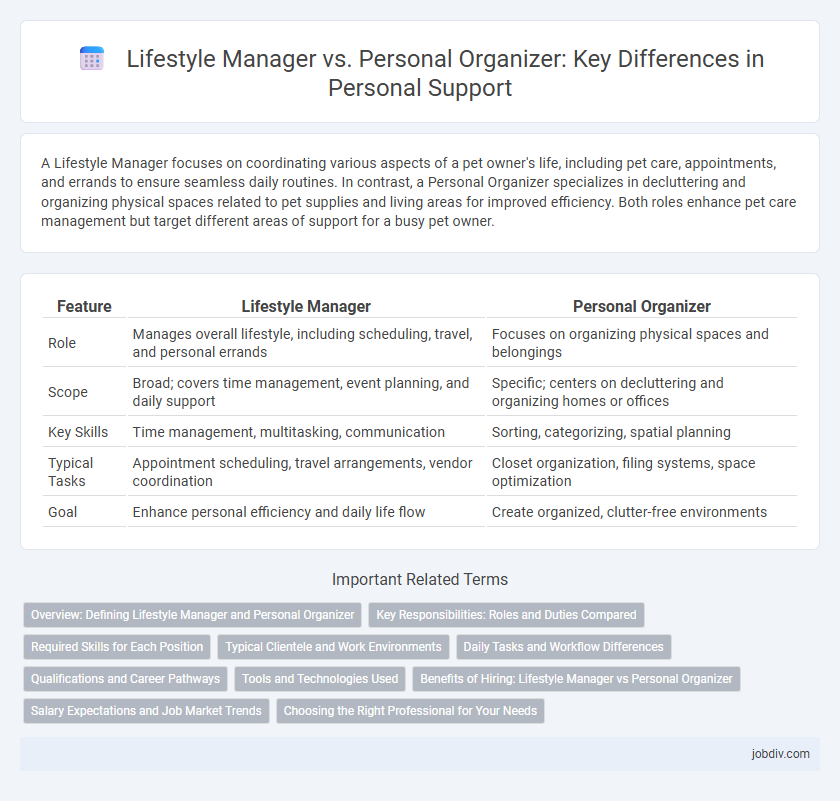A Lifestyle Manager focuses on coordinating various aspects of a pet owner's life, including pet care, appointments, and errands to ensure seamless daily routines. In contrast, a Personal Organizer specializes in decluttering and organizing physical spaces related to pet supplies and living areas for improved efficiency. Both roles enhance pet care management but target different areas of support for a busy pet owner.
Table of Comparison
| Feature | Lifestyle Manager | Personal Organizer |
|---|---|---|
| Role | Manages overall lifestyle, including scheduling, travel, and personal errands | Focuses on organizing physical spaces and belongings |
| Scope | Broad; covers time management, event planning, and daily support | Specific; centers on decluttering and organizing homes or offices |
| Key Skills | Time management, multitasking, communication | Sorting, categorizing, spatial planning |
| Typical Tasks | Appointment scheduling, travel arrangements, vendor coordination | Closet organization, filing systems, space optimization |
| Goal | Enhance personal efficiency and daily life flow | Create organized, clutter-free environments |
Overview: Defining Lifestyle Manager and Personal Organizer
A Lifestyle Manager coordinates various personal and professional tasks, enhancing overall quality of life by managing schedules, errands, and event planning. A Personal Organizer specializes in decluttering and systematizing physical spaces to improve efficiency and reduce stress. Both roles aim to streamline daily living but address different aspects of organization and time management.
Key Responsibilities: Roles and Duties Compared
Lifestyle Managers coordinate daily activities, manage schedules, and oversee personal and professional tasks to enhance clients' overall well-being. Personal Organizers specialize in decluttering, organizing physical spaces, and creating efficient systems to optimize home or office environments. While both roles improve personal productivity, Lifestyle Managers take a broader approach, involving life management, whereas Personal Organizers focus primarily on spatial order and organization.
Required Skills for Each Position
Lifestyle managers excel in strategic planning, interpersonal communication, and time management to coordinate complex personal and professional schedules. Personal organizers specialize in spatial organization, categorization, and decluttering skills tailored to optimize physical environments. Both roles require strong problem-solving abilities, but lifestyle managers lean towards relationship management while personal organizers emphasize efficiency in physical space.
Typical Clientele and Work Environments
Lifestyle managers typically serve high-net-worth individuals and busy professionals who require comprehensive support across personal and professional domains, often working in upscale residential settings or luxury offices. Personal organizers focus more on decluttering and optimizing space for clients such as homeowners, small business owners, or individuals seeking time management solutions, usually operating within clients' homes or small office environments. Both professionals tailor their services to improve efficiency and organization but differ in their scope and client engagement contexts.
Daily Tasks and Workflow Differences
A Lifestyle Manager oversees a broad range of daily activities, including managing schedules, coordinating errands, and handling personal projects to streamline overall life balance. A Personal Organizer specializes in organizing physical spaces, decluttering, and implementing storage systems to improve efficiency in the home or office environment. Workflow differences emphasize a Lifestyle Manager's role in multitasking and strategic planning, whereas a Personal Organizer focuses on detailed organization and spatial optimization.
Qualifications and Career Pathways
Lifestyle managers often hold certifications in life coaching or wellness management, emphasizing a holistic approach to personal efficiency and well-being. Personal organizers typically obtain credentials through professional organizing associations, focusing on decluttering, space optimization, and time management. Career pathways for lifestyle managers tend to include roles in wellness consulting and executive assistance, while personal organizers often progress through roles in home organization companies or independent consulting.
Tools and Technologies Used
Lifestyle Managers utilize advanced digital platforms like AI-driven scheduling apps, integrated smart home systems, and cloud-based project management tools to streamline clients' daily routines and long-term goals. Personal Organizers rely more on physical tools such as label makers, color-coded filing systems, and traditional planners, supplemented by basic digital calendars and reminder apps for task management. Both professions leverage technology to enhance efficiency, but Lifestyle Managers emphasize a holistic, tech-centric approach to managing various life aspects simultaneously.
Benefits of Hiring: Lifestyle Manager vs Personal Organizer
Hiring a lifestyle manager offers comprehensive support by coordinating personal, professional, and social aspects of life, resulting in increased productivity and reduced stress. A personal organizer specializes in decluttering and structuring physical spaces to improve efficiency and create a calming environment. Both services enhance quality of life, but a lifestyle manager provides holistic management while a personal organizer focuses on tangible organization improvements.
Salary Expectations and Job Market Trends
Salary expectations for Lifestyle Managers typically range from $50,000 to $90,000 annually, reflecting their broader responsibilities compared to Personal Organizers, whose salaries generally fall between $30,000 and $55,000. Job market trends indicate growing demand for Lifestyle Managers due to increasing client interest in comprehensive life management services, while Personal Organizers remain essential for targeted decluttering and organization tasks. Both roles benefit from the rising emphasis on work-life balance and home organization, with Lifestyle Managers often commanding higher salaries in metropolitan areas.
Choosing the Right Professional for Your Needs
Lifestyle managers offer comprehensive support by handling various aspects of your daily life, including errands, scheduling, and personal projects, providing a holistic approach to managing time and responsibilities. Personal organizers specialize in decluttering spaces and creating efficient systems to enhance organization and productivity within your home or office. Choosing the right professional depends on whether you need broad lifestyle management or focused organizational expertise tailored to your specific requirements.
Lifestyle Manager vs Personal Organizer Infographic

 jobdiv.com
jobdiv.com